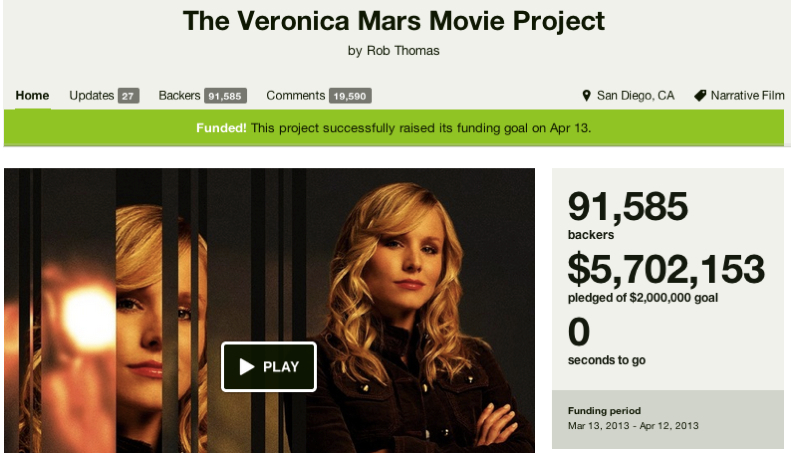by John Onorato (ghostwritten for PMD Partners)
To date, there have been many campaigns that happened mostly online. One very successful example is the Occupy movement. The “We are the 99%” crusade began in 2011. Another effective endeavor that still continues is the Human Rights Campaign (HRC), which went viral in 2013. These campaigns had many grassroots-type elements in them, allowing people to feel as if they had a personal stake in the destiny of the movement. These elements also contributed financially to the endeavors and got the groups talked about — thus ensuring their success with Crowdfunding Promotion.
There are many similar examples to be found in various places. Two great places to start looking are here on pmd-partners.com and also on kickstarter.com, where screenwriter Rob Thomas’ Veronica Mars movie project recently enjoyed so much success.
I Am Loving Awareness
For those not familiar with the TV series, Veronica Mars was set in a fictional California town. The eponymous character, played by Kristen Bell, was a high school student who at night was also a private investigator. She operated with the assistance of her father, a detective. The series lasted three years, over which time it accrued a significant fan base.

After the series ended, Thomas continued the project, writing a feature film script for Warner Bros. studios, who declined to back it. And here’s where the commonality with the other online campaigns is seen: The fans. Or, if you will, the fanatics. These two words have at their root the Latin “fanaticus,” a word describing speech or behavior that manifests when one is possessed by a god.
The fans certainly delivered for Thomas and Co.’s Veronica Mars. The project goal was $2 million; that was met within just ten hours of opening. Over 30 days, they raised over $5.7 million dollars, allowing Thomas and Warner Bros. to release the movie on March 14, 2014.
Clearly, fans can make things happen. Fanaticism makes things happen. Therefore it’s important to understand fanaticism, so as to be able to use its power within your own projects. It’s especially important to use within crowdfunding campaigns, which don’t have the same resources as large studios.
Primarily, there must be a reward for fans. In the case of the Veronica Mars fan base, the movie itself was the reward. Promise the fans something they really want, and they will be more willing to assist your endeavor. The cinematic continuation of the series was the whole reason why the project was backed in the first place.

Since Thomas ran the project on Kickstarter, he was able to promise additional rewards for higher levels of support. At $10, a backer would receive a PDF copy of the movie’s shooting script; at $35, a Veronica Mars T-shirt; and at $50, a physical DVD of the movie. If a person donated $1000 to the cause, they would also get two tickets to the movie premiere in either New York or Los Angeles, attended by the cast and creators, plus the after-party.
It’s interesting to note that not only is the pre-bought merchandise an expression of choice and desire for a certain thing, but it also conveys a recognition as a member of a common fan group. This, therefore, assists with the need for identification and belonging, which is well-documented that all humans have.
Many people, however, opted for no physical reward, choosing instead to funnel the resources that would be diverted towards their rewards back into the project. That says something for the nature of their fanaticism, and their devotion to the cause as well. This altruistic concern for the project may be for the project itself, but may also extend to other fans, so they too get to reap the benefits.

The power of cable television has changed the way programming is offered. At one time, several major networks delivered all available programming. Now the there are many different channels, some serving niches as small as The Horror Channel and Movies4Men. Moviemaking, too, is changing in a similar way. The fans are making this change possible, through the power of their fanaticism. With this they wield great power; clearly, as we see in the case of Veronica Mars, they can decide what gets funded and what does not. Although the fan base is not typically important for large studios, which have large amounts of money to invest in the next big budget film, it doesn’t necessarily deliver to the people what they want to see.
Therefore, fanaticism is a way for people to overcome the traditional unwillingness of larger studios to give them what they really want to see. It gives the people a way to take a stand on what they want to watch. Not only that, but it gives them a means to make it happen as well.
published link:
https://pmd-partners.com/true-fans-footprint-core-audience/

